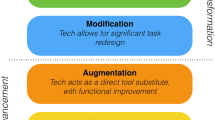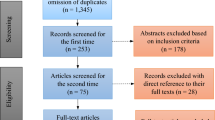Abstract
Teacher education faculty must incorporate and model effective use of Technological, Pedagogical, and Content Knowledge (TPACK) in the classroom and across the curriculum. Teacher education leaders have a responsibility to set direction, develop people, and redesign their teacher preparation programs into TPACK ready environments. As such, a change process may occur that may be challenging and difficult for some leaders and their faculty. In this article, the authors examine the process and product of creating a TPACK leadership diagnostic tool that provides leaders in teacher education with support and guidance for the process of developing TPACK ready teacher preparation programs. Suggestions for further development and usage of the diagnostic tool are discussed.




Similar content being viewed by others
References
AACTE Innovation and Technology Committee. (2008). The handbook of technological pedagogical content knowledge (TPCK) for educators. New York: Routledge/Taylor & Francis Group.
Abbitt, J. T. (2011). Measuring technological pedagogical content knowledge in preservice teacher education: a review of current methods and instruments. Journal of Research on Technology in Education, 43(4), 281–300.
Angeli, C., & Valanides, N. (2009). Epistemological and methodological issues for the conceptualization, development, and assessment of ICT & TPCK: advances in technological pedagogical content knowledge (TPCK). Computers & Education, 52(1), 154–168.
Archambault, L. M., & Barnett, J. H. (2010). Revisiting technological pedagogical content knowledge: exploring the TPACK framework. Computers & Education, 55(4), 1656–1662.
Argyris, C., & Schon, D. (1974). Theory in practice: increasing professional effectiveness. San Francisco: Jossey-Bass.
Argyris, C., Putnam, R., & McLain Smith, D. (1985). Action science: concepts, methods, and skills for research and intervention. San Francisco: Jossey-Bass.
Bennett, R. E. (2010). Cognitively based assessment of, for, and as learning (CBAL): a preliminary theory of action for summative and formative assessment. Measurement, 8, 70–91.
Brantley-Dias, L., & Ertmer, P. A. (2013). Goldilocks and TPACK: is the construct ‘just right?’. Journal of Research on Technology in Education, 46(2), 103–128.
Common Core State Standards Initiatives. (2017). Preparing America’s students for success. Retrieved from http://www.corestandards.org/.
Day, C., Sammons, P., Leithwood, K., & Kington, A. (2008). Research into the impact of school leadership on pupil outcomes: policy and research contexts. School Leadership & Management: Formerly School Organization, 28, 5–25.
Dexter, S., Herring, M., & Thomas, T. (2012). Editorial: Technology leadership for the teacher education initiative. Contemporary Issues in Technology and Teacher Education, 12(2), 255–263.
Fullan, M. (2010). All systems go: the change imperative for whole system reform. Thousand Oaks: Corwin.
Hallinger, P. (2010). Leading educational change: reflections on the practice of instructional and transformational leadership. In A. Walker & P. Hallinger (Eds.), Gateways to leading learning: leading educational change (pp. 2–37). Hong Kong: Hong Kong Institute of Education.
Harris, J. B., & Hofer, M. J. (2011). Technological pedagogical content knowledge (TPACK) in action: a descriptive study of secondary teachers’ curriculum-based, technology-related instructional planning. Journal of Research on Technology in Education, 43(3), 211–229.
Herring, M. C., Thomas, T., & Redmond, P. (2014). Special editorial: Technology leadership for preparing tomorrow's teachers to use technology. Journal of Digital Learning in Teacher Education, 30(3), 76–80.
Herring, M. C., Koehler, M. J., & Mishra, P. (2016). Handbook of technological pedagogical content knowledge (TPACK) for educators. New York, NY: Routledge.
Hill, P., & Celio, M. (1998). Fixing urban schools. Washington, DC: Brookings Institute.
Jang, S. J., & Chang, Y. (2016). Exploring the technological pedagogical and content knowledge (TPACK) of Taiwanese university physics instructors. Australasian Journal of Educational Technology, 32(1), 107–122.
Jang, S. J., & Tsai, M. F. (2012). Exploring the TPACK of Taiwanese elementary mathematics and science teachers with respect to use of interactive whiteboards. Computers & Education, 59(2), 327–338.
Koehler, M. J., & Mishra, P. (2008). Introducing TPCK. In AACTE Committee on Innovation and Technology (Eds.), Handbook of technological pedagogical content knowledge (TPCK) for educators (pp. 3–30). New York: Routledge.
Koehler, M. J., Mishra, P., Kereluik, K., Shin, T. S., & Graham, C. (2014). The technological pedagogical content knowledge (TPACK) framework. In J. M. Spector, M. D. Merrill, J. Ellen, & M. J. Bishop (Eds.), Handbook of research on educational communications and technology (4th ed., pp. 101–111). New York: Springer.
Leithwood, K., & Jantzi, D. (2008). Linking leadership to student learning: the contributions of leader efficacy. Educational Administration Quarterly, 44(4), 496–528.
Leithwood, K., & Riehl, C. (2003). What we know about successful school leadership. Philadelphia: Laboratory for Student Success, Temple University.
Leithwood, K., Harris, A., & Hopkins, D. (2008). Seven strong claims about successful school leadership. School Leadership and Management, 28(1), 27–42.
Louis, K. S., Leithwood, K., Wahlstrom, K. L., Anderson, S. E. (2010). Learning from leadership: investigating the links to improved student learning. Center for Applied Research and Educational Improvement/University of Minnesota. Retrieved from http://www.wallacefoundation.org/knowledge-center/Pages/Investigating-the-Links-to-Improved-Student-Learning.aspx.
Mishra, P., & Koehler, M. J. (2006). Technological pedagogical content knowledge: a framework for integrating technology in teacher knowledge. Teachers College Record, 108(6), 1017–1054.
Mouza, C., Karchmer-Klein, R., Nandakumar, R., Ozden, S. Y., & Hu, L. (2014). Investigating the impact of an integrated approach to the development of preservice teachers’ technological pedagogical content knowledge (TPACK). Computers & Education, 71, 206–221.
National Council for Accreditation of Teacher Education (NCATE) (2001). Standards for Professional Development Schools. Retrieved from http://www.ncate.org/Standards/tabid/107/Default.aspx.
Niess, M. L. (2005). Preparing teachers to teach science and mathematics with technology: developing a technology pedagogical content knowledge. Teaching and Teacher Education, 21(5), 509–523.
O’Donnovan, B., Price, M., & Rust, C. (2004). Know what I mean? Enhancing student understanding of assessment standards and criteria. Teaching in Higher Education, 9(3), 325–335.
Olofson, M. W., Swallow, M. J., & Neumann, M. D. (2016). TPACKing: a constructivist framing of TPACK to analyze teachers’ construction of knowledge. Computers & Education, 95, 188–201.
Rosenberg, J. M., & Koehler, M. J. (2015). Context and technological pedagogical content knowledge (TPACK): a systematic review. Journal of Research on Technology in Education, 47(3), 186–210.
Ross, J. A., & Gray, P. (2006). Transformational leadership and teacher commitment to organizational values: the mediating effects of collective teacher efficacy. School Effectiveness and School Improvement, 17(2), 179–199.
Salaway, G. (1987). An organizational learning approach to information systems development. MIS Quarterly, 11(2), 245–264.
Shulman, L. S. (1986). Those who understand: knowledge growth in teaching. Educational Researcher, 15(2), 4–31.
Thomas, T., Herring, M., Redmond, P., & Smaldino, S. (2013). Innovation, change, and technology: The evolution of a leadership module to develop TPACK ready teacher candidates. TechTrends, 57(5), 55–63.
U.S. Department of Education, Office of Educational Technology (2017). Reimagining the role of technology in education: 2017 national education technology plan update. Retrieved from https://tech.ed.gov/files/2017/01/NETP17.pdf.
Author information
Authors and Affiliations
Corresponding author
Rights and permissions
About this article
Cite this article
Graziano, K.J., Herring, M.C., Carpenter, J.P. et al. A TPACK Diagnostic Tool for Teacher Education Leaders. TechTrends 61, 372–379 (2017). https://doi.org/10.1007/s11528-017-0171-7
Published:
Issue Date:
DOI: https://doi.org/10.1007/s11528-017-0171-7




